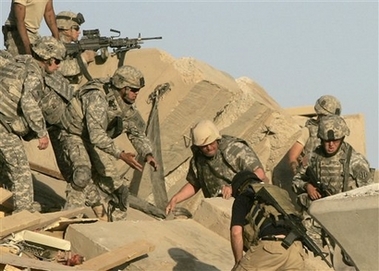Middle East
3 US troops killed in Iraq car bombing
(AP)
Updated: 2007-06-11 16:14
 |
Large Medium Small |
MAHMOUDIYA, Iraq - With a thunderous rumble and cloud of dust and smoke, a suicide car bomb brought down a section of highway bridge south of Baghdad on Sunday, killing three US soldiers and wounding six from a checkpoint guarding the crossing and blocking traffic on Iraq's main north-south artery.
Donald Campbell, a 40-year-old Scot with the private security firm Armor Group International, and his colleagues were in a passing convoy and worked with a US Army quick reaction force for some 45 minutes to pull trapped men from the rubble, scrambling over the fallen concrete.
US armored vehicles provided cover fire from their cannons after the bombing, which occurred in the area dubbed the "triangle of death" for its frequent Sunni insurgent attacks.
The blast dropped one of two sections of the "Checkpoint 20" bridge crossing over the north-south expressway, six miles east of Mahmoudiya.
It appeared that a northbound suicide driver stopped and detonated his vehicle beside a support pillar, said Lt. Col. Garry Bush, an Army munitions officer who was in the convoy, which also carried an Associated Press reporter and photographer and arrived two minutes after the blast.
A US Army checkpoint and a tent structure, apparently a rest area, fell into the shattered concrete. The crossing was believed to have been closed to all but military traffic at the time.
Armor Group security guards, all ex-military, and others in the convoy rushed to the ruins. They found a scene of confusion.
"When that size blast went off, everyone was in shock," said one of the first atop the rubble, Jackie Smith, 53, a former lieutenant colonel now working as a civilian Army munitions expert.
He said he saw what he believed was the engine block of a truck - apparently what remained of the suicide vehicle.
Soon the outpost sergeant in charge was organizing a search for his missing men, Smith said. The Armor Group team climbed up with first-aid kits, stretchers and other aid.
With the Army's quick reaction force, they struggled to lift concrete shards off the men, pinned along the slope of what was once a roadway. At one point, a Bradley armored vehicle with a tow chain pulled a slab off a pinned victim to free him.
Then a shout went up, "Morphine! Morphine!" and a black T-shirt-clad Briton administered painkiller to the freed man.
"Another poor fellow looked crushed beneath a concrete slab," said the Armor Group's Campbell.
During the rescue, US armored vehicles opened up with suppressing fire, possibly having spotted movement in the surrounding countryside, flat and baking in 100-degree-plus Fahrenheit temperatures.
Traffic was delayed for over an hour until a medevac helicopter landed to take aboard the wounded, and traffic slowly resumed under the remaining section of the span.
Iraqi police said the overpass was a vital link across the highway for villagers in the area because the other spans have been taken over by US forces. A police officer in nearby Iskandariyah, speaking on condition of anonymity because of security concerns, said a curfew had been imposed on vehicles and pedestrians after the attack and earlier bombings of a mosque and a Sunni political party's headquarters that caused some damage but no casualties.
In Baghdad, Maj. Gen. Rick Lynch, whose forces control the area of the bombing, spoke at length about US efforts to draw Sunnis into the security forces.
"There are tribal sheiks out there who say 'Hey, just allow me to be the local security force. I don't care what you call me. ... You can call me whatever you want. Just give me the right training and equipment and I'll secure my area.' And that's the direction we're moving out there," the Third Infantry Division commander said.
In a meeting with reporters, Lynch said contacts with the Sunnis, who make up the bulk of the insurgency, were a matter of pragmatism.
"They say: 'We hate you because you are an occupier, but we hate al-Qaida worse and we hate the Persians (Iranians) even worse' ... you can't ignore that whole population," Lynch said.
His division, he said, had lost 43 soldiers since the beginning of the US troop surge on Feb. 14.
Also Sunday, a suicide truck bomber struck an Iraqi police office in Tikrit, killing at least 15 people and wounding 50, police said.
The explosion destroyed a building housing the highway police directorate in the Albu Ajil village on the eastern outskirts of ousted leader Saddam Hussein's hometown, a police officer said, speaking on condition of anonymity because of security concerns. Tikrit is 80 miles north of Baghdad.
The attacker detonated his payload after smashing into a blast wall, flattening a small reception building and damaging the main two-story building 20 meters away, the officer said, adding that most of those killed and wounded were police.
| 分享按钮 |

